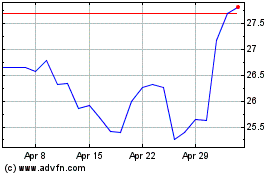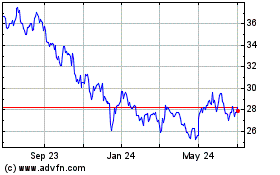Pfizer, Allergan to Hunt for Deals of Their Own
April 06 2016 - 8:11PM
Dow Jones News
By Jonathan D. Rockoff
Now that their $150 billion deal with each other is over, Pfizer
Inc. and Allergan PLC will look to do deals of their own.
Pfizer must still find acquisitions to boost its revenue and
growth, according to a person familiar with the matter. But the
company has given up on doing another tax-inversion transaction,
given the Treasury Department's clear opposition, according to the
person.
Allergan CEO Brent Saunders struck a similar note, saying the
company could do its own deal at any time to add to its pipeline or
portfolio.
"We could act immediately if we saw the right opportunity with
the right growth profile and the right strategic logic," he said in
an interview.
Each company was seeking to quickly move past the planned
combination Wednesday, after announcing they were abandoning the
deal in the wake of new Treasury Department rules designed to deter
so-called inversions like theirs, which garner lower tax rates by
moving tax headquarters overseas.
Pfizer's decision to walk away marked the biggest withdrawal
ever from a deal, according to Dealogic. Under the terms, Pfizer
will pay $150 million to reimburse Allergan for transaction-related
expenses.
By hooking up with Dublin-based Allergan, Pfizer would have not
only benefited from lower tax rates. The tie-up would have also
added Botox and other fast-growing Allergan products to Pfizer's
modestly rising sales. Such a boost would have accelerated Pfizer's
growth, and might have paved the way for Pfizer to set loose its
slower-growing but cash-generating "established products" business
selling older drugs.
Now, Pfizer must find a new way to put its new-drugs business on
firmer ground if it is to go independent, some analysts say.
After a $16 billion takeover of Hospira solidified Pfizer's
established-products business, "Pfizer probably has critical mass
to transform" that into an independent company, but the company's
patent-protected-drugs side may need "additional assets acquired
from outside," Evercore ISI analyst Mark Schoenebaum said in a note
to investors.
Pfizer moved up the deadline for deciding whether to shed the
older-drugs business to the end of this year, the company said in a
statement.
Pfizer has "the financial strength and flexibility to pursue
attractive business development and other shareholder-friendly
capital allocation opportunities," CEO Ian Read said in the
statement.
In an internal company email, Mr. Read told employees that
Pfizer "knew there would be risks," and even though it had to
abandon the combination "based on the actions taken" by the
Treasury Department, it would benefit from pre-integration efforts
to simplify the company's structure and strengthen its commercial
operations.
Allergan sales are growing by double-digit percentages, in part
because of Botox's increasing appeal for antiwrinkle use and
mounting treatment of medical conditions like chronic migraines and
overactive bladders. Executives also see strong sales potential
from new products, such as the antipsychotic Vraylar, which the
company is launching this week.
Executives also tout strong commercial potential in several
Allergan drugs in late-stage development, though analysts see some
threats to key products like the Restasis dry-eye drug.
The deal would have allowed Allergan to take advantage of
Pfizer's extensive operations outside the U.S., which the company
said could have provided a sizable sales boost. Now, Allergan will
have to build out its overseas business on its own.
After agreeing to a merger last November, Pfizer and Allergan
had said they structured their combination to fit within U.S. tax
law and federal tax regulations. The Treasury Department rules,
issued Monday and effective immediately, added a new wrinkle: They
took aim at tax inversions involving companies like Allergan, which
has grown through several acquisitions over the past several
years.
Yet, many Allergan employees welcomed the deal's cancellation,
because it would mean an end to the disruption and uncertainty that
accompanies being acquired, Mr. Saunders said. "This is a very easy
pivot for us," he said.
In a call with senior management, Mr. Saunders acknowledged the
distraction, and anxiety triggered by the prospective combination
but said its termination wouldn't mean an end to change at
Allergan.
"We have to be willing to work in an environment where the
unexpected is expected," Mr. Saunders said.
Write to Jonathan D. Rockoff at Jonathan.Rockoff@wsj.com
(END) Dow Jones Newswires
April 06, 2016 19:56 ET (23:56 GMT)
Copyright (c) 2016 Dow Jones & Company, Inc.
Pfizer (NYSE:PFE)
Historical Stock Chart
From Mar 2024 to Apr 2024

Pfizer (NYSE:PFE)
Historical Stock Chart
From Apr 2023 to Apr 2024
